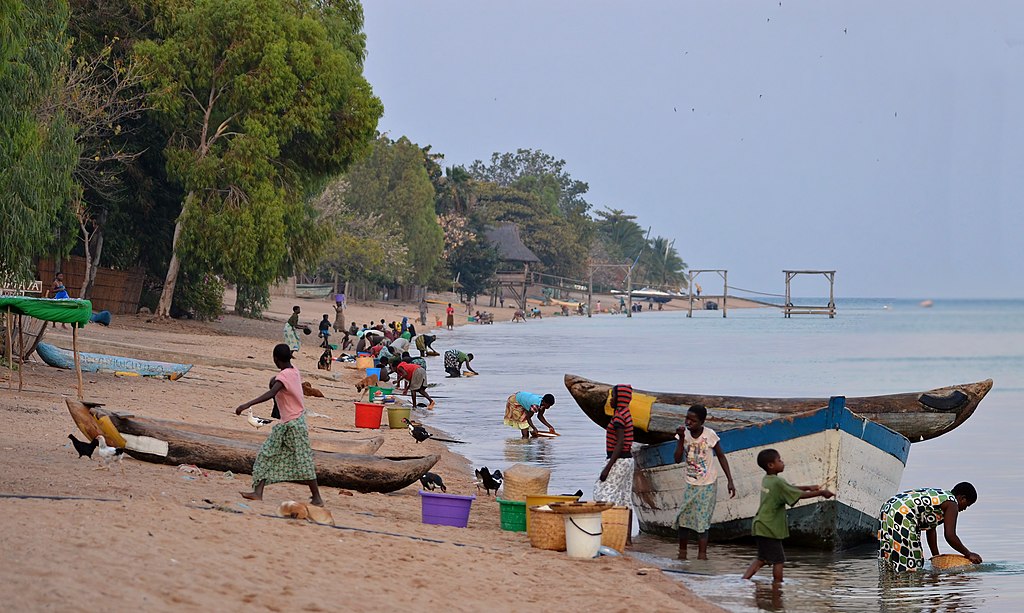By Elisa Cink
Image courtes of © Hans Hillewaert / CC BY-SA 4.0
Malawi is currently facing the worst outbreak of cholera in the country’s history. Cholera is a waterborne disease caused by the vibrio cholerae bacterium that affects the small intestine and is transmitted through water or foods contaminated by feces from a person infected with cholera.1 In Malawi, poor sanitation and hygiene practices are the major causes of cholera. The most recent outbreak started in March of 2022 and since then there have been more than 36,943 suspected cases and 1,210 suspected deaths of Cholera throughout all 29 districts of Malawi.2
Prior to the most recent outbreak, Malawi had almost completely eradicated the disease through water sanitation and national vaccine efforts. In 2015, the government worked with traditional leaders to build latrines and handwashing facilities to prevent open defecation in water. In 2017, Malawi administered almost three million cholera vaccines throughout the country which reduced case numbers to double digits.3 However, heavy rainfall from typhoons and cyclones in Southern Africa caused severe flooding which destroyed latrines and water sanitation efforts. 4 Global vaccine shortages have prevented Malawi from running a vaccination campaign for the past five years, and vaccine immunity only lasts a few years.5,6 Other factors have also contributed to the outbreak. Illegal mining camps have contaminated the Lake Malawi water source by using it as a toilet. The COVID-19 pandemic also created economic hardship resulting in 5.4 million Malawians facing hunger. Starvation can weaken the immune system making it harder to fight off and survive cholera.4 Many people are also moving to Malawi’s cities which have created shanty towns that lack toilets and clean drinking water.3 All of these factors created the perfect environment for vibrio cholerae to flourish, resulting in Malawi facing almost a year of its deadliest cholera outbreak. Typically cholera has a death rate of 1% but in Malawi the death rate is currently 3.3%.
Malawi’s outbreak comes amid a global surge in cholera outbreaks, which have restricted the availability of vaccines, tests, and treatments.2 Dr Charles Mwansambo, Malawi’s Secretary for Health, has declared that Malawi ran out of cholera vaccines in January. While vaccines are important for preventing transmission, Mwansambo declared that cholera can only be effectively eradicated through improved water, sanitation, and hygiene.7 Cholera can be life threatening because it dehydrates the body so quickly which is why oral rehydration solution (ORS) and liquid IVs are crucial to treatment.1 People infected with cholera need to be treated with ORS immediately. Many healthcare facilities and workers are overwhelmed with the amount of people seeking care. There is also a lot of misinformation and mistrust in the government that prevents Malwians from seeking care. This is resulting in many people either seeking care too late or dying at home and having unsafe burials that don’t adhere to the guidelines for burying cholera patients.8
Fortunately, Non Governmental Organizations (NGOs) have stepped up to support Malawi with its cholera outbreak. UNICEF has provided 400 healthcare workers and is assisting all districts in Malawi with acute watery diarrhea kits, essential medicines, and infection prevention and control supplies.8 Volunteers from the Malawi Red Cross Society (MRCS) are helping administer ORS, ensure water sanitation supplies are safe, and raise awareness of reducing the spread of the disease by going door-to-door.9 The UN resident coordinator in Malawi also stated, “The United Nations is currently in the process of preparing a multisector cholera appeal to increase the capacity of the U.N. and NGOs to support the government of Malawi. It will be launched next week”. It has been reported that Malawi will need around $40 million to contain the disease.7 Malawi stands out as an example of how cholera can quickly spread in countries where the disease had been nearly eliminated. In order to combat cholera, the global community needs to prioritize the production and distribution of the cholera vaccine and access to clean water sanitation facilities.
References
1. CDC. General Information | Cholera | CDC. Published September 30, 2022. Accessed February 16, 2023. https://www.cdc.gov/cholera/general/index.html
2. WHO. Cholera – Malawi. Published February 9, 2023. Accessed February 10, 2023. https://www.who.int/emergencies/disease-outbreak-news/item/2022-DON435
3. Golden Mantonga, John Eligon. In a Nation That Nearly Wiped Out Cholera, the Disease Is Surging Back – The New York Times. Published January 22, 2023. Accessed February 10, 2023. https://www.nytimes.com/2023/01/22/world/africa/malawi-cholera-outbreak.html
4. CARE. Cholera Outbreak Worsens in Malawi as Hunger Increases. CARE. Published November 21, 2022. Accessed February 10, 2023. https://www.care.org/news-and-stories/press-releases/cholera-outbreak-worsens-in-malawi-as-hunger-increases/
5. Kerry Cullinan. Malawi Battles Worst Cholera Outbreak Ever Amid Ongoing Global Vaccine Shortage – Health Policy Watch. Published February 9, 2023. Accessed February 10, 2023. https://healthpolicy-watch.news/malawi-battles-worst-cholera-outbreak-ever-amid-ongoing-global-vaccine-shortage/
6. MSF. Malawi: MSF responds to the country’s worst cholera outbreak on record. Doctors Without Borders – USA. Accessed February 10, 2023. https://www.doctorswithoutborders.org/latest/malawi-msf-responds-countrys-worst-cholera-outbreak-record
7. Masina L. Malawi Launches Campaign to End Deadly Cholera Outbreak. VOA. Published February 14, 2023. Accessed February 17, 2023. https://www.voanews.com/a/malawi-launches-campaign-to-end-deadly-cholera-outbreak-/6962655.html
8. Lulutani Tembo. Racing against time to save cholera patients. Published February 13, 2023. Accessed February 17, 2023. https://www.unicef.org/malawi/stories/racing-against-time-save-cholera-patients
9. Malawi Red Cross Society. Malawi: Red Cross scales up response to worst cholera outbreak in two decades | IFRC. Accessed February 17, 2023. https://www.ifrc.org/press-release/malawi-red-cross-scales-response-worst-cholera-outbreak-two-decades


